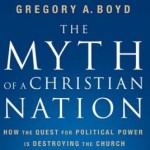We run our website the way we wished the whole internet worked: we provide high quality original content with no ads. We are funded solely by your direct support. Please consider supporting this project.

Political Solutions Won’t Save Us
Image by h.koppdelaney via Flickr
Jesus followers must retain a healthy suspicion toward every version of the kingdom of the world. After all, on the authority of God’s Word, we know that however good a particular government may be by world standards, it is nevertheless strongly influenced by fallen principalities and powers. Consequently, no kingdom-of-God citizen should ever place undue trust in any political ideology or program. Nor should they be overly shocked when kingdom-of-the-world leaders or parties act contrary to Christ’s ways. The Roman officials of Jesus’ day frequently behaved in grossly immoral ways, but neither Jesus nor any NT author exhibit any surprise or concern over this. It was, it seems, par for the course for kingdom-of-the-world leaders in their view.
Jesus’ life and ministry consistently preserved the radical uniqueness of the kingdom he came to establish. To appreciate this distinction, we need to understand that the Jewish world Jesus was born into was a political hotbed. There was constant political and cultural friction between the ruling Romans and their Jewish subjects, and most Jews despised the fact that they, “the true people of God,” were tyrannically ruled by God-denying, immoral pagans.
At the same time, first-century Jews were deeply divided over how to respond. The zealots wanted to take up arms against the Romans and drive them out. On the other extreme were the “conservatives” who thought it best to cooperate with the Roman government as much as possible. In between these two extremes were a number of different options.
Should Jews obey Roman laws, and if so, which ones? Should they pay taxes to Caesar? Should they participate in the Roman army? Should they pledge their allegiance to their reigning government by paying homage to statues of emperors? The list was almost endless.
Into this intensely politicized situation Jesus was born. And not surprisingly, throughout his ministry people tried to get him to weigh in on these issues. They were expecting a political messiah who would answer their questions, solve their problems, and liberate them. What they didn’t understand—what even Jesus’ own disciples were slow to learn—was that Jesus hadn’t come to answer their kingdom-of-the-world questions or solve their kingdom-of-the-world problems.
Jesus didn’t come to give the Christian answer to the world’s many sociopolitical quandaries, and he didn’t come to usher in a new and improved version of the kingdom of the world. His agenda was far more radical, for he came to redeem the world and ultimately overthrow the kingdom of the world by ushering in an alternative kingdom. He came not to give solutions, tweak external regulations, and enforce better behavior.
Jesus’ mission wasn’t to improve the old; his mission, and the mission he gave his disciples, was to embody the new—an entirely new way of doing life. It is life lived within the reign of God; life centered on God as the sole source of one’s security, worth, and significance; life lived free from self-protective fear; and life manifested in Calvary-like service to others. His promise is that as his disciples manifest the unique beauty and power of this life, it will slowly and inconspicuously—like a mustard seed—grow and take over the garden.
—Adapted from Myth of a Christian Nation, pages 55-60
Category: General
Tags: Government, Kingdom of this World, Politics
Topics: Ethical, Cultural and Political Issues
Related Reading

Praying for Peace During Political Hostility
Jesus calls his disciples to be “peacemakers” (Mt 5:9). During this season of political animosity, we have a great opportunity to practice being disciples by offering an alternative way of interacting with each other. One primary way we do this is by using the unique authority we have to affect the world through prayer to…

The Bible, Government and Christian Anarchy
This “essay” contains my informal reflections on biblical texts that I believe support what some call “Christian Anarchy.” Consider it a very rough draft of a future project. I’ll argue that Kingdom people are called to pledge their allegiance to God alone, not to any nation, government, political party or ideology. Because Kingdom people are…

Are You Anti-American?
Greg answers the frequently asked question of whether he is anti-American. What’s your best guess? Watch the video and find out!

You Have What We Call a Theological Problem
Peter Enns posted a blog entitled: Dear Christian: If the Thought of Either Romney or Obama Getting Elected Makes You Fearful, Angry, or Depressed, You Have What we Call a Theological Problem. He makes some pretty good points. What do your emotions around this election tell you about where your hope lies? From the blog: There…

What I – a Pacifist – Would say to Obama About the Crisis In Syria
Over the last week many of you have written ReKnew asking me to weigh in on the crisis in Syria. Does being a pacifist mean that I am opposed to America violently intervening to keep Assad from using chemical weapons against his own people? And if so, what would I say if Obama asked for…

“The kingdom of God…advances only by exercising power under others. It expands by manifesting the power of self-sacrificial, Calvary-like love.” [Quotes]
“While all the versions of the kingdom of the world acquire and exercise power over others, the kingdom of God, incarnated and modeled in the person of Jesus Christ, advances only by exercising power under others. It expands by manifesting the power of self-sacrificial, Calvary-like love.”
